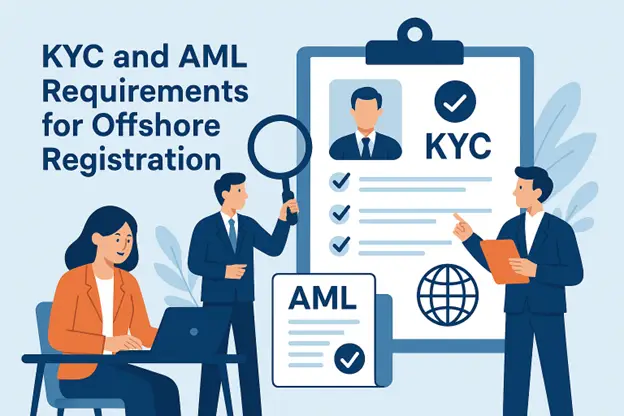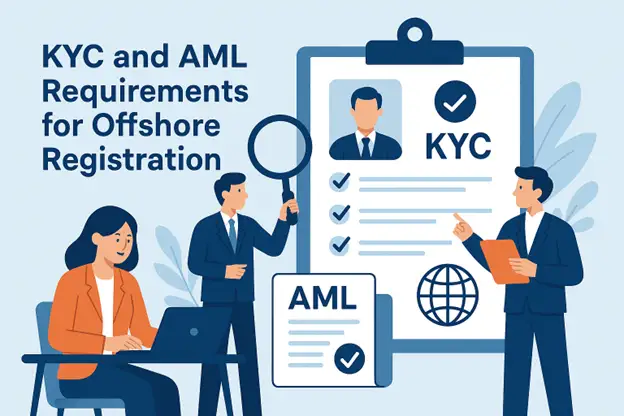KYC and AML Requirements for Offshore Company Registration
Establishing an offshore company can be a sensible choice for corporate executives, investors and entrepreneurs looking to expand globally. However, it is important to understand this because it is accompanied by KYC (Know Your Customer) and AML (Anti-Money Laundering) requirements. Even when establishing an offshore company for the purpose of reducing taxes, protecting assets, or operating an online business, most trusted jurisdictions now require strict compliance with international financial regulations. This includes identification, financial documents and ensuring transparency of business activities. This guide explains the meaning, importance and impact of KYC and AML on the establishment of an offshore company.
What is KYC in Offshore Company Formation?
Know Your Customer (KYC) is a process for offshore jurisdictions, banks, and service providers to verify customer status. This is intended to prevent illegal activities such as money laundering, tax evasion, and terrorist financing.
In offshore registration, KYC is usually required by the following entities:
- Company establishment agency
- Offshore Banks
- Government regulators
- Financial services provider
You’ll typically need to provide:
- Valid passport
- Proof of address (utility bill, etc.)
- Personal resume or job resume
- Details of business activities
- Bank recommendations or financial statements
Some jurisdictions also require a lawyer or notary to submit certification documents or completed compliance forms.
What is AML and Why Is It Important?
AML (Anti-Money Laundering) refers to laws and regulations that prevent funds obtained by illegal means from flowing into the financial system. Offshore jurisdictions are under pressure from international organizations such as the Financial Action Task Force (FATF) to implement AML laws. This requires offshore service providers to evaluate customer risk levels and monitor ongoing activities.
AML checks may include:
- Collation of sanctions and politically important persons
- Check funding sources
- Understanding customers' business objectives
- Continuous monitoring of suspicious transactions
AML is not just a temporary check. Even after offshore companies are established, ongoing due diligence is often required.
Why Are KYC and AML Rules Strict for Offshore Companies?
The offshore structure may be considered a risk of financial crime due to the privacy provided. Therefore, governments and international monitoring agencies are looking for more transparency.
Strict rules include:
- Anti-exploitation of offshore companies
- Compliance with international obligations such as FATCA, CRS and EU regulations
- Financial Center Reputation Protection
- Ensure access to banking services by indicating that jurisdictions are clean
In short, more stringent KYC and AML mean that businesses can enjoy tax incentives and privacy only when they are legitimate and transparent.
Key Documents Required for KYC & AML
Although the required documents may vary depending on the jurisdiction, here is a list of the most sought-after documents for offshore company establishment and bank account opening:
Document | Purpose |
Passport Copy | Identity verification |
Utility Bill | Proof of address |
Bank Reference Letter | Financial history |
CV/Resume | Professional background |
Source of Funds | To explain how you earned your money |
Business Plan or Description | To show the company’s activity |
Tax ID (if available) | To confirm tax status in your country |
Some banks and countries may also require video authentication or live Zoom calls for identification.
Which Offshore Jurisdictions Have Strong KYC/AML Rules?
If you are looking for a trusted offshore jurisdiction, you should choose one that already employs international best practices. This reduces problems when opening an offshore bank account or developing a global business.
The following are famous offshore regions with solid compliance standards:
- British Virgin Islands (BVI)
- Cayman Islands
- Belize
- Hong Kong
- Singapore
- Cyprus
- UAE Free Zone
These areas are considered the best choice for crypto asset businesses, technology startups and online entrepreneurs. This is because it combines regulatory transparency with business management flexibility.
What Happens If You Don’t Meet KYC or AML Standards?
If you do not submit the required KYC or AML documents, the registration of the offshore company may be delayed or even rejected. Specific risks include:
- Application rejected
- Delayed opening of bank accounts
- Freeze or close existing accounts
- Legal fines or international sanctions
Therefore, it is very important to cooperate with experienced offshore establishment services that can properly guide the requirements.
How to Prepare for Offshore KYC and AML Checks
To get the process going smoothly, follow these simple steps:
- Prepare all personal identification documents in advance
- Honestly explain the source of funds
- Explaining business models clearly
- Choose the right jurisdiction for your business type
- Keep up to date with compliance requirements
Many entrepreneurs are not aware that compliance requirements vary from industry to industry. For example, crypto asset companies are required to submit more powerful documents than regular consulting companies.
Offshore Banking and KYC Compliance
One of the biggest challenges in offshore registration is opening corporate bank accounts. Most international banks may request detailed KYC documents and refuse to open an account if the documents are defective.
Important bank-related KYC checks include:
- Business activities and customer confirmation
- Verify company UBO (final beneficiary)
- Submission of tax residence certificate
- Regular account review
Therefore, it is recommended to work with providers that provide both offshore company establishment and offshore banking support.
Offshore KYC Rules for Different Business Types
Below is an overview of how KYC and AML compliance differ depending on the business form you register:
Business Type | KYC/AML Focus Areas |
Crypto Business | Strongest KYC needed, including source of crypto funds |
E-commerce | Proof of suppliers, payment processors |
Consulting Services | Client contracts or invoices |
Investment Holding | Clear source of investment funds |
SaaS or Tech Startup | Business model clarity and source of initial funding |
Why Offshore KYC is Different from Onshore KYC
Many people tend to think that offshore KYC is more moderate, but it is actually the opposite. In most cases, offshore banks and company registrations follow stricter guidelines due to additional risks and global pressure from regulators.
For example:
- Offshore companies are monitored more strictly in transnational transactions
- Many banks use international compliance software to detect risk factors
- Offshore jurisdictions are cautious about defending their reputation and banking relationships
Therefore, if you plan to register offshore, be prepared to ask more questions.
OffshoreCompanyReg.com – Your Trusted Partner in Offshore Setups
At OffshoreCompanyReg we understand that KYC and AML compliance response is overwhelming, especially when starting a business in a foreign jurisdiction. Therefore, we provide full support at all stages. Simplify the entire process from collecting and reviewing necessary documents to direct collaboration with offshore banks and regulators. Our experienced team ensures your establishment meets all legal requirements and avoids delays and complexity. No matter which offshore region you are considering establishing your company, such as BVI, Hong Kong, Belize, UAE or Singapore, our team will ensure full legal compliance.
- Provides a guide to meet KYC/AML standards
- Help collect, prepare and submit necessary documents
- Assist in opening offshore bank accounts with pre-reviewed banks
- We also provide the owner service to ensure privacy and flexibility
If you are considering which tax residence or offshore company is best suited for your case, we will help you choose the best option.
Conclusion
The establishment of an offshore company is an effective means for business expansion, tax reduction, and asset protection, but it needs to be done legally and appropriately. As KYC and AML rules are tightened, it is more important than ever to work with teams that understand international compliance. OffshoreCompanyReg.com provides professional support to establish offshore companies, open bank accounts, and ensure full compliance from the first day. Any Crypto entrepreneur, digital nomad or investor can easily and securely register offshore.
Legal Disclaimer
This article is just for information. It’s not legal or financial advice. Talk to an expert before you set up anything.
Next Steps
👉 Download our Free Guide – Avoid the 7 biggest mistakes with offshore companies!
👉 Book a discovery call with one of our team here: Select a Date & Time - Discovery Call
🔗 Helpful Links
- Check out our latest blog: Can HMRC Access My Bank Accounts? (2025 Guide)
- Watch Our YouTube Videos
- Subscribe to Offshore Made Simple
- Subscribe to Offshore Secrets

